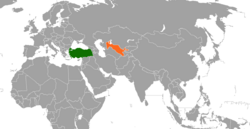Turkey–Uzbekistan relations
 | |
Turkey |
Uzbekistan |
|---|---|
| Diplomatic mission | |
| Turkish Embassy, Tashkent | Uzbek Embassy, Ankara |
Following Uzbekistan's independence from the Soviet Union, Turkey has been especially active in pursuing economic projects and social, cultural, and diplomatic initiatives in Uzbekistan. On December 16, 1991 Turkey was the first[1] country to recognize Uzbekistan and among the first to open an embassy in Tashkent.[1]
During the early 1990s, Turkey has made early commitments for expansion of trade and cooperation,[2] funding Uzbek development schemes with a US$700 million (worth $1.3 billion USD in 2020) credit[3] and pledging yearly 2,000 scholarships[4] for Uzbek students to study in Turkey.
Since then, Turkey and Uzbekistan have developed a strong relationship with more than 100 bilateral agreements and protocols concluded between the two countries.[5] Uzbekistan, as the only[1] Central Asian state bordering on all other countries, is important to the Turkish commitment in ensuring stability, prosperity, and security in Central Asia.[5]
Since gaining independence, Uzbek wariness of Russian influence led Uzbekistan to seek closer ties with other countries.[6] The cultural kinship and proximity of Turkey has encouraged close relations and allowed to create relations[7] with its immediate Central Asian neighbors, Russia and other nations of the CIS.[8]
Both Turkey and Uzbekistan are full members of the Organization of Turkic States. Turkey has been a participant to the political entity since the Nakhchivan Agreement in 2009, and Uzbekistan joined as a full-fledged member in 2019.
Economic relations
- Trade volume between the two countries was 2.3 billion USD in 2019.[5]
- There are around 1,300 companies with Turkish capital in Uzbekistan.[5]
Presidential visits
| Guest | Host | Place of visit | Date of visit |
|---|---|---|---|
| Presidential Complex, Ankara | February 19–20, 2020[5] | ||
| Tashkent | March 29–30, 2022[9] |
See also
- Foreign relations of Turkey
- Foreign relations of Uzbekistan
- Turks in Uzbekistan
- Mendirman Jaloliddin
References
- ^ a b c Nichol,James. "Uzbekistan: Basic Facts," CRS Report for Congress, May 28, 1996.
- ^ Hale, Henry. "Islam, State-building, and Uzbekistan Foreign Policy," pp. 136–72 in Ali Banuazizi and Myron Weiner, eds., The New Geopolitics of Central Asia and Its Borderlands. Bloomington: Indiana University Press, 1994.
- ^ Akbarzadeh, Shahram. "Nation Building in Uzbekistan," Central Asian Survey [Abingdon, United Kingdom], 15, March 1996, pp. 23-32.
- ^ Ferdinand, Peter, ed. The New States of Central Asia and Their Neighbors. New York: Council on Foreign Relations Press, 1994.
- ^ a b c d e "Relations between Turkey and Uzbekistan". Ministry of Foreign Affairs of Turkey.
- ^ Rubinstein, Alvin Z. "The Geopolitical Pull on Russia," Orbis, 38, No. 3, Summer 1995, 567-84.
- ^ Henley, John S., and George B. Assaf. "Re-Integrating the Central Asian Republics into the World Economy," Intereconomics, 30, September–October 1995, pp. 235-45.
- ^ Horton, Scott, and Tatiana Geller. "Secured Transactions in Uzbekistan," Central Asia Monitor, 1996, No. 2, 21-7.
- ^ "Cumhurbaşkanı Erdoğan, Özbekistan'a gitti". www.aa.com.tr (in Turkish). Retrieved 2022-08-02.

